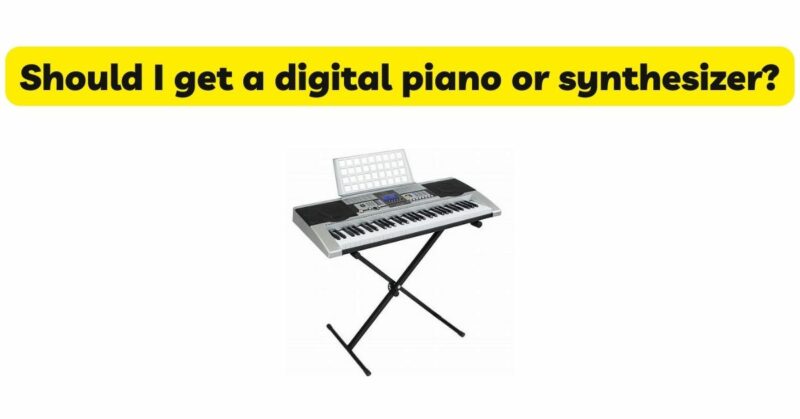In the realm of keyboard instruments, choosing between a digital piano and a synthesizer can be a perplexing decision. Both instruments offer unique features and capabilities that cater to different musical preferences and needs. To make an informed choice, it is essential to consider factors such as sound quality, versatility, performance capabilities, user interface, and budget. In this article, we will explore the distinctions between digital pianos and synthesizers, helping you determine which instrument aligns best with your musical goals and aspirations.
- Sound Quality and Authenticity:
When considering sound quality, digital pianos and synthesizers present distinct characteristics. Digital pianos aim to replicate the sound and feel of an acoustic piano, offering authentic piano tones through advanced sound sampling technology. The focus is on producing realistic piano sounds, encompassing the full range of dynamics and tonal nuances associated with an acoustic instrument.
On the other hand, synthesizers prioritize versatility and sound manipulation capabilities. They provide a wide range of sounds beyond traditional piano tones, including synth leads, pads, basses, and experimental effects. Synthesizers offer extensive sound design options, allowing musicians to sculpt unique timbres and textures. However, it’s important to note that while synthesizers can produce piano-like tones, they may not match the authenticity and depth of a dedicated digital piano.
- Versatility and Sound Exploration:
Versatility is a key factor when deciding between a digital piano and a synthesizer. Digital pianos excel in their ability to replicate the piano playing experience, making them an ideal choice for those focused on traditional piano playing styles and genres. They typically feature weighted keys that mimic the touch and response of an acoustic piano, providing an authentic playing experience. However, digital pianos often have limited sound options beyond piano tones, restricting the range of musical exploration.
In contrast, synthesizers offer a vast array of sound options and sound-shaping capabilities. They are designed to create, manipulate, and experiment with various sounds and textures. Synthesizers can produce classic analog synth sounds, modern digital tones, and even emulate other instruments. They are particularly suitable for genres like electronic, ambient, and experimental music, providing ample room for sonic exploration and creativity.
- Performance Capabilities:
The performance capabilities of an instrument are essential considerations for musicians who intend to perform live or record music. Digital pianos are designed to offer an authentic piano playing experience, with features like weighted keys, responsive touch sensitivity, and built-in speakers or audio outputs. They are ideal for solo performances, ensemble playing, or accompanying other musicians. Digital pianos may also incorporate additional features such as recording capabilities, metronomes, and built-in song libraries.
Synthesizers, on the other hand, provide extensive performance features beyond traditional piano playing. They often include advanced arpeggiators, sequencers, and modulation controls that allow for real-time sound manipulation and expressive performance techniques. Synthesizers can be used to create complex layered sounds, perform intricate melodic sequences, and engage in live improvisation. However, the absence of weighted keys may impact the playing experience for those specifically seeking a piano-like feel.
- User Interface and Ease of Use:
The user interface and ease of use play a significant role in the overall experience of playing an instrument. Digital pianos tend to have a user-friendly interface, typically featuring a layout similar to an acoustic piano with a minimal number of buttons and controls. They prioritize simplicity, focusing on providing an intuitive playing experience that closely resembles a traditional piano. This makes digital pianos accessible for beginners and those who prefer a straightforward approach.
Synthesizers, on the other hand, feature a more complex user interface due to their vast sound design capabilities. They often include various knobs, sliders, and buttons to control parameters, envelopes, filters, and modulation options. While this complexity may initially seem overwhelming, it offers musicians greater control and customization possibilities over their sound. Synthesizers are more suited for those who enjoy exploring different sonic possibilities and are willing to invest time in learning the instrument’s functionality.
- Budget Considerations:
Budget is an important factor to consider when purchasing a digital piano or synthesizer. Digital pianos vary in price depending on factors such as the quality of the key action, sound sampling technology, and additional features. Higher-end digital pianos tend to be more expensive but offer superior sound quality and a more authentic playing experience. However, there are also affordable options available for beginners or those with budget constraints.
Synthesizers come in a wide price range, with entry-level models and professional-grade options. The price is typically influenced by factors such as the quality of sound generation, the number of voices, the complexity of the sound engine, and additional performance features. Advanced synthesizers with extensive sound design capabilities tend to be more expensive. It is important to align your budget with your specific requirements and long-term musical goals.
Conclusion:
In conclusion, the choice between a digital piano and a synthesizer depends on your musical preferences, goals, and budget. Digital pianos prioritize authenticity, offering a piano-focused experience with realistic sound and touch sensitivity. They are ideal for those who aspire to play traditional piano music or require an instrument that closely resembles an acoustic piano.
Synthesizers excel in versatility, sound exploration, and performance capabilities. They provide a wide range of sound options, sound manipulation features, and performance enhancements. Synthesizers are particularly suitable for musicians interested in electronic music, sound design, and creative experimentation.
Ultimately, the decision between a digital piano and a synthesizer hinges on your musical aspirations, desired sound palette, and the type of performance or recording you envision. It is beneficial to try out different instruments, consult with knowledgeable musicians or music educators, and consider your long-term musical journey to make an informed choice that will inspire and enhance your musical creativity.


